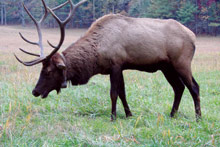Crisp autumn afternoons are a sure sign that the all-American parking-lot ritual of devouring meat and processed food is under way. Yet a ballgame isn’t the only reason for a tailgate party. In the Great Smoky Mountains National Park, the sporting attraction is more likely to be a herd of elk.

By late afternoon, the herd typically assembles and grazes in the historic Cataloochee Valley on the park’s eastern edge. And so do the people—lots of them. Some recline in camp chairs, plate of food in hand, mere yards from the elegant but potentially hungry elk. You begin to wonder who’s watching whom.
And if tailgating in a national park seems strange—especially on a gravel road in a remote valley—the growing numbers of mobile smorgasbords have made the phenomenon as ordinary as third and long. The result, however, is traffic, plus the typical muddle that comes from stuffing too many people into too small an area.
Ground zero lies at the end of the valley road, where a gravel lot sits next to an old barn. Cars come and go, but on a typical fall day you’ll see a dozen or so vehicles parked in the lot. Among the others I spied during a recent visit was a fleet of vehicles from northeast Georgia representing three generations of the Lovell family. The Lovell tailgates were loaded with an assortment of dishes: potato salad, casseroles, hot dogs, vanilla pudding, slaw, chili and macaroni salad.
“It’s pretty nice to come to a place like this,” said Persimmon, Ga., resident Don Lovell, leaning against a white Jeep and clutching a soda. “I like the family atmosphere and seeing the elk. It’s special to show the kids things they have never seen. For them, it’s a big thrill.”
The valley’s serenity and historic structures have drawn visitors for decades, and thanks to the wildlife, interest is growing. The Lovell tailgate has become a family tradition, and the trend seems to be catching on, particularly on weekends in leaf season and during the rut—the elk’s fall mating season. In the process, it’s transforming the once-tranquil area.
Prior to the animals’ 2001 reintroduction into the park, Cataloochee averaged about 75,000 visitors per year. Since then, visitation has doubled, and the valley has become the national-park equivalent of a Disney experiment gone wild. That’s put a heavy burden on the portable toilets, trash receptacles and the lone road that runs the length of the valley, ranger Mark LaShell reports. One of two rangers stationed in Cataloochee, he spent his entire shift during one recent weekend directing gridlocked traffic along a particularly narrow stretch of road.
The herd now numbers nearly 100, and it’s closely monitored for issues such as possible conflicts with human visitors, says LaShell. Although many gazers never leave their seats, some stroll far too close. This, of course, worries rangers like LaShell: Elk outweigh most people by several hundred pounds, and despite their size, they’re surprisingly swift.
“They may look docile, but they are wild animals,” he emphasizes. “People need to be aware that the potential for an attack is definitely there. Elk can be dangerous.” To date, however, there hasn’t been actual elk/human physical contact since the herd was established in the park. In part, that safety record is due to the work of the Elk Bugle Corps—National Park Service volunteers who educate visitors about the herd and keep overzealous spectators a safe distance away from the elk and their deadly antlers, which are as thick as a human femur.
Perhaps the biggest problem, then, is the stuff in plastic wrappers and tin cans. Ultimately, the greatest threat to the elk herd is introducing these animals to chicken legs and Fritos—exactly the foodstuffs tailgaters are bringing with them. “The food is the worst thing we can do to them,” says LaShell. “Once they get the taste for our food, they seek it out.” And when any wild creature starts consuming human food, he notes, its life expectancy is typically cut in half.
Nonetheless, LaShell and others argue that the throngs of new visitors, particularly the tailgaters, are crucial to the popular park’s long-term preservation. “I can hand out tickets all day long,” he says. “But what will protect the park are people who are willing to fight for it. We need more people [feeling] connected to the Smokies: That will make a difference.”
And while that kind of interest doubtless comes with a price, these tailgaters may be onto something. Waiting for elk takes patience, but sitting back as the herd assembles and the light subtly shifts may be one of the richest experiences enjoyed by any of the Smokies’ many visitors.
In the meantime, LaShell hopes that adding more parking places and getting funding to upgrade the restrooms will support the budding tradition in this picturesque Appalachian valley.
“There’s no place like it,” says tailgater Lovell. “We are here to enjoy the creation.”
[Jack Igelman lives in Asheville.]


Before you comment
The comments section is here to provide a platform for civil dialogue on the issues we face together as a local community. Xpress is committed to offering this platform for all voices, but when the tone of the discussion gets nasty or strays off topic, we believe many people choose not to participate. Xpress editors are determined to moderate comments to ensure a constructive interchange is maintained. All comments judged not to be in keeping with the spirit of civil discourse will be removed and repeat violators will be banned. See here for our terms of service. Thank you for being part of this effort to promote respectful discussion.